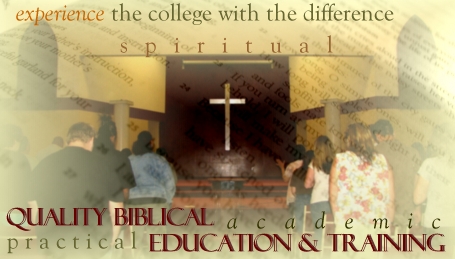Study the Bible With Denis your own personal Bible teacher (Bring your note book!)
Gentle reader,
About the meaning of the word rendered "Gospel" there is no question or doubt; and the origin and exact meaning of the English word does not matter. The Greek word evangelion means good news, glad tidings; and these good tidings, which may be concerning various and different subjects, must be distinguished.
Note: See Phil. 1:10, which says this "That ye may approve things that are excellent *; that ye may be sincere and without offence till the day of Christ" * translated to mean things that differ (We are to test the things that differ, and having found them different should not attempt to join or put them together, but to "rightly divide them" 2 Tim. 2:15 "Study to shew thyself approved unto God, a workman that needeth not to be ashamed, rightly dividing the word of truth. (KJV) or The Literal Translation "Give diligence to present yourself approved to God, a workman unashamed, rightly dividing the Word of Truth". Which I have studying the original have translated this way "You, yourself, be diligent to present approved to God as a workman who needs not to be ashamed handling accurately the word of the Truth"
There is, first :
"THE EVERLASTING GOSPEL" (or GOOD NEWS).
This was proclaimed from the first, i.e. after the Fall, and it was proclaimed to men as men, by God, the Creator, to His creatures. Its message was that the Creator alone to be feared and worshipped, and men were to have no other gods beside Him. He was the holy and righteous One, and He was, and is, and will be the only and final Judge of men. God proclaimed this from the first, and among its heralds were ENOCH, "the seventh from Adam", who proclaimed His coming for this judgment of the ungodly (Jude 14:15); and NOAH, a herald of righteousness and of coming righteous judgment (Heb. 11:7 and 2Pet, 2:5).
When the "calling on high" shall have been given (Phil. 3:14), and when "transgressors are come to the full" (Dan. 8:23), and before the Kingdom is set up in glory, this Gospel (or Good News) will again be proclaimed (Rev. 14:6). It is "everlasting", and men, as such, will be called upon to "Fear God, and give glory to Him; for the hour of His judgment is come : and worship Him that made heaven, and earth", &c (Rev. 14:7). This is the Gospel proclaimed by the Creator to His sinful creatures after the Fall; and it will be proclaimed again at the end. Hence its name "everlasting". Then followed :
THE GOSPEL (or GOOD NEWS) OF THE KINGDOM.
To Abraham and his seed was the good news proclaimed, and the promise given that God would make of him a nation in whom all the families of the earth should be blessed (Gen. 12:1-3). This good news was gradually expanded and developed. In Gen. 15:4 the heir was announced, and this heir was to be the Messiah (Gal. 3:16). In Gen. 15:8-21 the inheritance was secured by an unconditional promise (not by a covenant between two parties, one of whom might break it, Gal. 3:18-20). That inheritance was (and is yet to be) "the Holy Land", "Immanuel's Land" (Isa. 8:8 ) , Immanuel Himself being the Governor (Isa. 9:6, 7), and "the zeal of the LORD of hosts" its security.
In 2Sam. 7 the throne was secured to David and his seed by another unconditional promise, and in due time Messiah came unto His own (John 1:11). This "good news" was first heralded by angels sent specially from heaven; and the exact terms of the proclamation are recorded. The angel of Jehovah spoke from the glory of Jehovah, and said :
"Behold, I bring you good tidings of great joy, which shall be to all people. For unto you is born this day, in the city of David, a SAVIOUR, which is CHRIST, THE LORD."
Thus the good news concerned a Person, Who would "save His people from their sins" (Matt. 1:21) : the Saviour Whom God had anointed (Messiah), appointed, given, and sent. In the proclamation of this Kingdom the Lord taught in Parables; for there were "mysteries" (i.e. secrets) which concerned the rejection, and consequent postponement and abeyance of the Kingdom, which could not openly be made known, but only in private ("in the house", Matt. 13:36).
It had been foreseen, and therefore foretold, that His People would not receive Him, and would reject Him (Isa. 53, &c) and put Him to death. This would not affect the fulfilment of all the promised glories connected with the Kingdom. See Luke 24:26: "Ought not Christ to have suffered these things, and to enter into His glory?" Cp. Acts 3:18; 17:3. True, Christ had been put to death; but God had sworn to David, that of the fruit of his loins, according to the flesh, He would raise up Christ to sit on his throne (Acts 2:30). This was now fulfilled : therefore the proclamation of the Kingdom and the King (for there cannot be the one without the other) was at once formally made by Peter in Acts 3:18-26.
This proclamation was made by Peter and the Twelve in the capital of the Land (according to Matt. 22:1-7), and by Paul throughout the synagogues of the Dispersion, until it was all brought to a crisis in Rome (the capital of the Dispersion). Paul and those who heard the Lord thus "confirmed what at the first began to be spoken by the Lord". They did not go beyond it by altering its terms; and God bare them "witness by signs and wonders, and divers miracles, and spiritual gifts" (Heb. 2:1-4).
In Acts 28 this was brought to a conclusion by a formal rejection on the part of "the chief of the Jews" (Acts 28:17-20), and of these, not a few, but "many" (v. 23); and, after a discussion, which lasted throughout the whole day, the proclamation was finally rejected; and, after the prophecy of Israel's blindness (Isa. 6:9, 10) had been quoted for the third and last time ( The second time being in John 12:37-41).
The dispensation of the proclamation of "the Gospel (or good news) of the Kingdom" ceased, and is now, therefore, in abeyance, for "NOW, we see NOT YET all things put under Him" (Heb. 2:8 ) .
All these "mysteries" (or secrets) concerning the postponement and abeyance of the Kingdom were spoken "in parables", "because (the LORD said), it is given unto you (unto the disciples) to know the secrets of the kingdom of heaven, but to them (to the People) it is not given" (Matt. 13:11); going on to explain His action by quoting (for the first time) the prophecy of Israel's blindness (Isa. 6:9, 10).
There was nothing in Old Testament prophecy that told of what the Lord reveals in these Parables of the Kingdom : how it would be rejected, and to what lengths the People would go in the rejection of the King; what would happen in consequence; how a second offer would be proclaimed, and how that too would be rejected : and what new revelation would be made in consequence.
All this was hidden in the parables spoken by the Lord, yet revealed to the disciples, and written for our learning (Matt. 13:16, 36, 51, 52. Luke 24:26, 27, 44-46. Acts 1:3, 6, 7). Any interpretation which proceeds on other lines can only end in a blindness equal to that which fell on the Jewish nation. This interpretation will in no wise detract from, or lessen, the value of such application as we may make for ourselves, so long as such application does not ignore the definite revelation made subsequently in the Prison Epistles in fulfilment of the Lord's promise in John 16:12-15. Next Time we will take up the parables set forth within the proclamation in the gospel of the Kingdom.
So Gentle Reader you will find many preachers who will try to tell you they are trying to bring in the Kingdom, not knowing that they are living in another time and place. Don’t be fooled by the undereducated. And by all means check me out that I don’t teach something that does not square with Scripture.
Love,
Denis





No comments:
Post a Comment